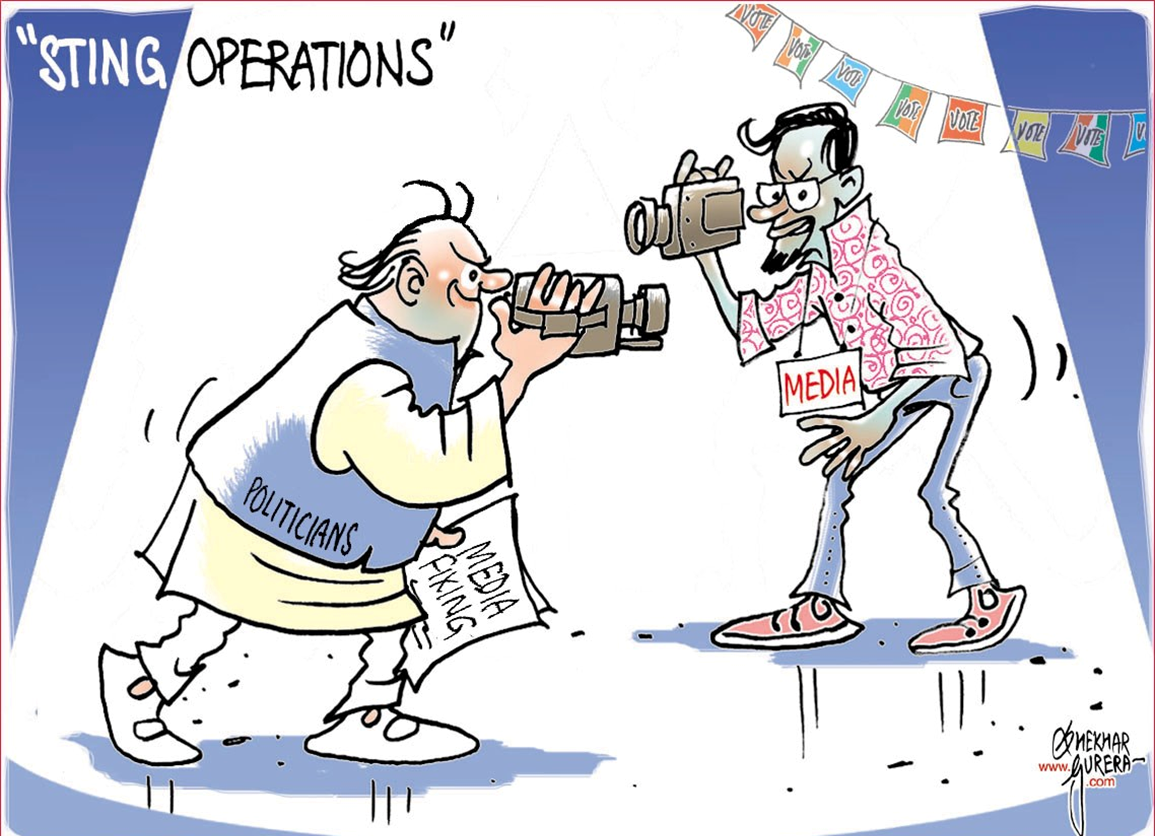The Sting: Good Journalism,Bad Journalism?

NEW DELHI: Are Stings good journalism, or bad journalism? Or are they journalism at all? This is a question that scribes have often asked themselves, with opinion being divided as some of these ‘stings’ have exposed major fraud and corruption, and actually got in resignations of powerful political persons with former Defence Minister George Fernandes coming immediately to mind.
Most journalists with integrity will not carry out what are popularly referred to as ‘sting operations’. Implicit in the term is the fact that these are carried out on tape, (audio or video) without the target knowing that he or she is being recorded. In the process the interviewer, posing as someone else usually, lulls the target into a sense of complacency, asks the awkward questions, records the conversation secretly through a hidden camera or tape recorder, and then publishes it to expose that person. This has been done in India through magazines, newspapers, television, books et al with journalists turning into C category detectives to bring out the facts through deceit.
Of course the term deceit is not kosher, and is not used, because the ‘sting’ is supposed to be for the larger good. And the man (or woman) being ‘stung’ is the bad ‘un and not the person carrying out the ‘sting.’
Not willing to pass a moral judgement on an issue of such import, I have to confess though that stings for me constitute everything that journalism should not be. Why? For the following reasons:
Good journalism thrives on being upfront, responsible and accountable. Stings drive the journalist into the exact opposite side where he or she hides who he or she is, and adopts devious methods, lies and subterfuge to get to the truth. In the process journalism moves from a trustworthy credible profession into an area defined by a deficit of trust, that cuts into the basic foundation of what has often been referred to as the fourth estate.
Stings constitute lazy journalism. There is no story really that stings have revealed that cannot be brought out with painstaking investigation. Some of the biggest newspapers and television news channels in the world have relied---Watergate is a case in point---and still rely, on meticulous investigation to expose big stories. These are more tedious, more difficult but can be and are still being done. Hidden cameras and recorders are the lazy scribes short cut that usually reveal little except hype.
Stings remain sensational, with little substance. One can list any number of sting operations run by television news channels here that might be covered through screaming headlines, but say little beyond what is already known. A very recent one---probably being aired as one writes---is a case in point where nothing has been said that is not already in the public domain. And yet it is being showcased as the channel's big sting.
Stings are cowardly journalism. Look at the reports being filed from across the world by brave journalists in the war field, covering conflict, questioning the extremists, speaking to the terrorists and writing it all down. Or for that matter telecasting it. Authors too have sat and worked for days and weeks with the Taliban, criticised and attacked the extremists in reports and books, and gone back for more interviews. Several names come immediately to mind. Journalists in India have covered the Punjab insurgency under Bhindranwale, reported on the Assam violence, written and interviewed insurgents in Kashmir, spoken to Naxalites and never used concealed cameras and tape recorders. This is done at risk to the journalist, but then that is the risk that is associated with and interwoven into the profession. Intrinsically so.
Stings make journalists pariahs. Even those applauding the sting operation become wary of the journalist, and reluctant to talk. Do you have a hidden camera, is the asked or unasked question that takes away completely from the profession that works on trust and credibility. And integrity of the highest kind. Investigation is dependent on sources and sources depend on the scribes word. An impression that a journalist can move out of this into a world of deceit with concealed cameras cuts into this trust and makes the task of scribes difficult, if not completely impossible.
There is not a story that cannot be covered through old fashioned investigation, without a change in identity, or with concealed cameras. Usually as part of ethical journalism, scribes are told that if they tape a person they should inform him or her, and take permission. The biggest insult to my mind is when persons warn each other in a room not to speak as “there is a journalist here” or turn and ask, “are you carrying a hidden tape recorder?”
Stings, thus, are not journalism. There is journalism, and then there are stings.



